Meet . . . our Engagement Committee
Natalia Zielonka
Chair, Engagement Committee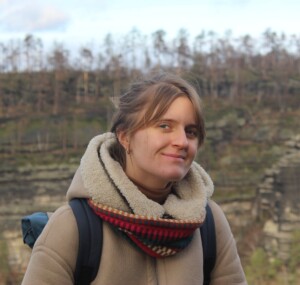
Nat is a research fellow at DICE at the University of Kent. She is interested in the interactions between people’s wellbeing, nature engagement and biodiversity and her research informs the design of multifunctional landscapes. Prior to this, Nat researched the relationships between rewilding and shrubland birds as a Conservation Scientist at the RSPB, and the role of biodiversity in fruit farms in Brazil and the UK, during her PhD at the University of East Anglia. Nat has been BOU’s Social Media Support Officer and a member of the Engagement Committee since 2021, and she is committed to making scientific research and ornithology widely accessible and inclusive.
Sam Barrett
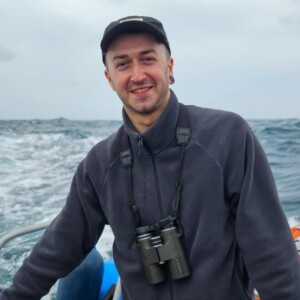
Sam is a PhD student at the University of Salford with interests in bioacoustics and the effect of noise pollution on wildlife. He is currently researching the impact of drone noise on birds, using passive acoustic recorders and computer vision techniques to assess avian response to simulated take-off/landing events. Sam earned a BSc in Wildlife and Practical Conservation from the University of Salford, during which he spent a year at Wildfowl & Wetlands Trust (WWT) Slimbridge as the Reserves Management Office & Research Intern. His commitment to avian research continued with an MSc by Research in Biology at the University of St Andrews, where he investigated the environmental factors influencing territory selection in Corn Buntings (Emberiza calandra).
Ondřej Belfín
Conference Support Officer 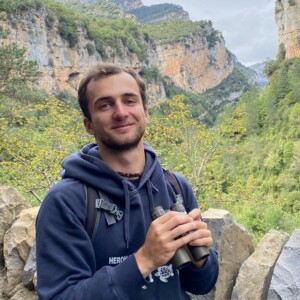
Ondrej has been following his childhood dream, trying to understand bird language and sharing this passion with others. Through his research, he discovered the diversity in the songs of Red-breasted Flycatchers and explored the limits of passive acoustic monitoring. His current focus is on studying the complex communication of shorebirds as he prepares for his PhD at Birdeyes, a new science and creative centre that literally looks at the world from a bird’s perspective. In the meantime, he has been involved in outreach activities at the Czech Society for Ornithology by leading the country’s first comprehensive bird identification course and academy for young ornithologists.
Jamie Dunning
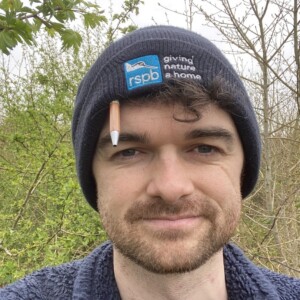
Jamie is broadly interested in birds, and studies how they interact with each other – how they communicate information and socialise – and the causes and consequences of these interactions. He is currently a research fellow, studying bird behaviour and disease transmission, at the University of Leeds. Before that, he completed a PhD at Imperial College London on sociality and female reproductive behaviour in birds.
Danielle Hinchcliffe
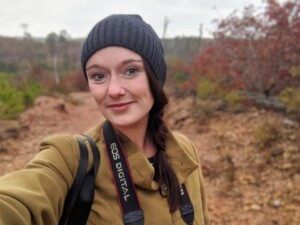
Danni is a lecturer in Conservation Biology and Ecology at Liverpool John Moores University. Danni gained a Molecular Ecology PhD at the University of East Anglia where she studied the once critically-endangered Seychelles warbler and participated in its successful translocation to Fregate Island. She since worked as a Senior Scientist for an NGO and as a Teaching Fellow/now Honorary Lecturer at University of Salford. Her ornithological research uses a combination of molecular and ecological tools to understand how birds adapt to environmental challenges. She uses a range of eco-physiological and behavioural tools to investigate individual and population-level responses and use this information to optimise conservation management. Danni is a Senior Teaching Fellow of the Higher Education Academy and an associate editor for the British Ecological Society journal, Ecological Solutions and Evidence.
Katharine Keogan
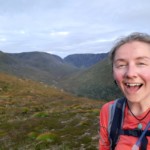
Kat is an ornithologist with a love of macroecology, looking for patterns across large datasets, and the sea. Currently working as a data scientist with HiDef Aerial Surveying, a consultancy based in Edinburgh, which involves research and analysis for Environmental Impact Assessments for offshore wind development. She has a C permit for ringing seabirds and is a committee member for the Lothian Ringing Group.
Ashleigh Marshall
Journal Support Officer
Ashleigh completed a PhD in Conservation Biology with the ZSL Institute of Zoology and University College London in 2023, with her research focused on investigating hatching failure in wild and managed bird populations. She took a multidisciplinary approach which included conducting fieldwork in Aotearoa New Zealand and applying various methods such as meta-analysis, molecular techniques, microbiome analyses, and fluorescence microscopy. She is passionate about evidence-based conservation and science communication, regularly taking part in online and in-person public outreach activities as well as previously acting as Social Media Editor for the Zoological Journal of the Linnean Society and volunteering with the RSPB at a city-centre nature reserve in Belfast, Northern Ireland.
Alex Nicol-Harper

Alex (she/her) is a researcher at WWT, the charity for wetlands and wildlife. In that role she provides scientific support to both UK-based and overseas conservation and ecology projects, mostly focusing on bird species. She has an MSc in Biodiversity, Conservation and Management, with dissertation fieldwork studying urban bird populations in Tenerife, and a PhD on seabird breeding ecology from the University of Southampton, involving lots of population modelling but also some public engagement. During her PhD she was a representative on the National Oceanography Centre’s Athena SWAN (equality, diversity and inclusion) Self-Assessment Team. Since 2021, she has also been an Associate Trustee for the Hampshire & Isle of Wight Wildlife Trust. Alex has lived experience of working in the environmental sector with a more recently acquired physical disability, but still enjoys birding and watching the seasons change when out in nature.
Charlie Russell
Blog Editor 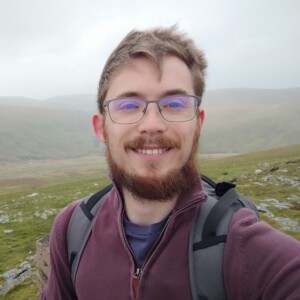
Charlie is a PhD student at the University of East Anglia, UK where he primarily studies migratory birds and how exposure to different anthropogenic threats impacts population trends. He is interested in understanding how we can translate individual mortality risks to population-level risks, whilst accounting for the complex interactions between the dynamic elements of human and bird behaviour. His work uses Greater Spotted Eagles as a case study, a species he is particularly fond of.
Charlie has a background working with raptors, and before starting his PhD he worked in policy and for NGOs in various capacities, including in-situ conservation of vultures in southern Africa.
Clarissa Santos
Equality and Diversity Support Officer 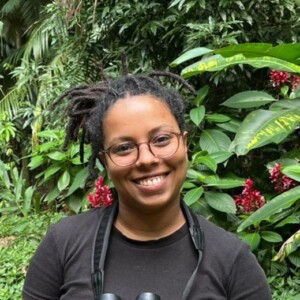
Clarissa is a PhD student at the University of São Paulo (Brazil) with a strong interest in the conservation of migratory birds. Her research focuses on the ecology and conservation of the Purple Martin, investigating its migratory routes, health, and threats throughout the annual cycle using fieldwork, geolocators, stable isotopes, and contaminant analyses. She coordinates the Purple Martin Project in Brazil, a community science initiative that monitors the species’ roosting sites across the country.
Clarissa is also engaged in efforts to promote equity and diversity in ornithology and science in Brazil. In addition, she is passionate about science communication through design and scientific illustration.
Elwyn Sharps

Elwyn (he/him) currently works for Natural Resources Wales (NRW) as a Marine and Coastal Ornithologist. Since completing his PhD looking at effects of livestock grazing of saltmarshes on breeding Redshank he has also worked as a Conservation Scientist and Conservation Officer for the RSPB, as Field Survey Manager for CEH and as People and Places Officer for NRW. Elwyn has been bird-mad since he was a teenager. He grew up spending his weekends and school holidays volunteering at RSPB Conwy and was fortunate enough to get his first paid job as an Information Warden at this reserve at the young age of just 16 years old, meaning his career in conservation has spanned over 20 years to date. Outside of work Elwyn has played an active role in the ornithological community. He spent four years on the International Wader Study Group’s Executive Committee as Publicity Officer – which involved managing the groups social media and publicity. In addition, after completing Stonewall’s ‘Workplace Trans Allies programme’ Elwyn volunteered for the RSPB as an Equality, Diversity and Inclusion advisor. Elwyn is a keen runner and is currently training for the London Marathon, a challenge he is completing in aid of WWF-UK.
River Stewart
Social Media Support Officer 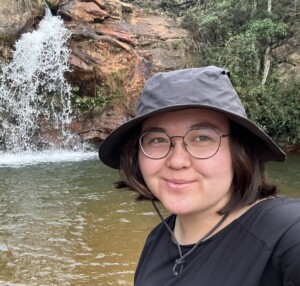
River Stewart (they) is an undergraduate student studying Geology at the University of Portsmouth, driven by an ongoing passion for better communication across the scientific community. They are working towards a career within the offshore surveying industry, having completed a year working as an offshore geophysicist for their industrial placement. At university they are active within the student community, previously leading both the Mountain Biking Society & Esports society as president, and acting as the BSc Geology course representative on the student voice panel. They are currently also volunteering as part the ECN (Early Careers Network of The Geological Society of London) in promoting career networking & scientific collaboration. In their spare time, they like to visit wildlife reserves and walk, their personal interest in ornithology deriving from a lifelong interest in landscape photography and habitat conservation.
Leila Walker
Chief Operations Officer
Leila has responsibility for the day to day management and running of the BOU including conferences and events, the business side of the BOU’s journal, IBIS, social media and communications, website development and content management and servicing BOU Council and its Standing Committees.
Karolina Zalewska
 Karolina is a PhD student at the University of East Anglia. Her project focuses on behavioural and demographic responses to exposure to a range of climatic conditions. In particular, she investigates the importance of climatic niches as well as the use of microclimate refugia and how these may be linked to population trends and spatial usage. Karolina is also interested in how con- and hetero-specific interactions within communities shape behaviour and population dynamics.
Karolina is a PhD student at the University of East Anglia. Her project focuses on behavioural and demographic responses to exposure to a range of climatic conditions. In particular, she investigates the importance of climatic niches as well as the use of microclimate refugia and how these may be linked to population trends and spatial usage. Karolina is also interested in how con- and hetero-specific interactions within communities shape behaviour and population dynamics.



